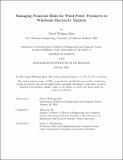Managing Financial Risks for Wind Power Producers in Wholesale Electricity Markets
Author(s)
Shen, Daniel Weihang
DownloadThesis PDF (1.501Mb)
Advisor
Ilic, Marija D.
Terms of use
Metadata
Show full item recordAbstract
Wind power plant operators are exposed to financial risk in wholesale electricity markets due to the uncertain nature of wind forecasts, day-ahead electricity prices, and real-time electricity prices. In the event of a shortfall compared to the production forecast, the wind generator may have to repurchase power at a higher price in the real-time market. Based on this consideration, this thesis formulates a mixed-integer quadratic program which uses conditional value at risk to create a hedged “risk-aware” offer curve for the wind generator to submit into the day-ahead electricity market. The formulated program additionally considers specific concerns around the offer optimization process being negatively interpreted as using physical withholding to increase profits. We also exploit the structure of the problem to introduce additional constraints to improve computation time and demonstrate that despite the complexity of mixed-integer variables it can be solved within an acceptable operating timeframe under realistic conditions. We simulate the impacts on financial returns for the generator of applying such an approach for a wind farm in the New York City region; the program can be successfully tuned to adjust the variability in returns based on the agent’s preferences, but does not outperform a more naive strategy of simply cutting off the quantity based on a percentile of the forecast distribution. Finally, we provide some discussion on how the act of “active” price creation through these risk-aware offer curves could come into conflict with the current regulatory environment, especially around the concept of exercise of market power, which has long relied on tying fair prices to ones that represent marginal fuel costs for generators.
Date issued
2024-02Department
Massachusetts Institute of Technology. Department of Electrical Engineering and Computer SciencePublisher
Massachusetts Institute of Technology